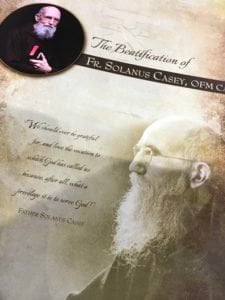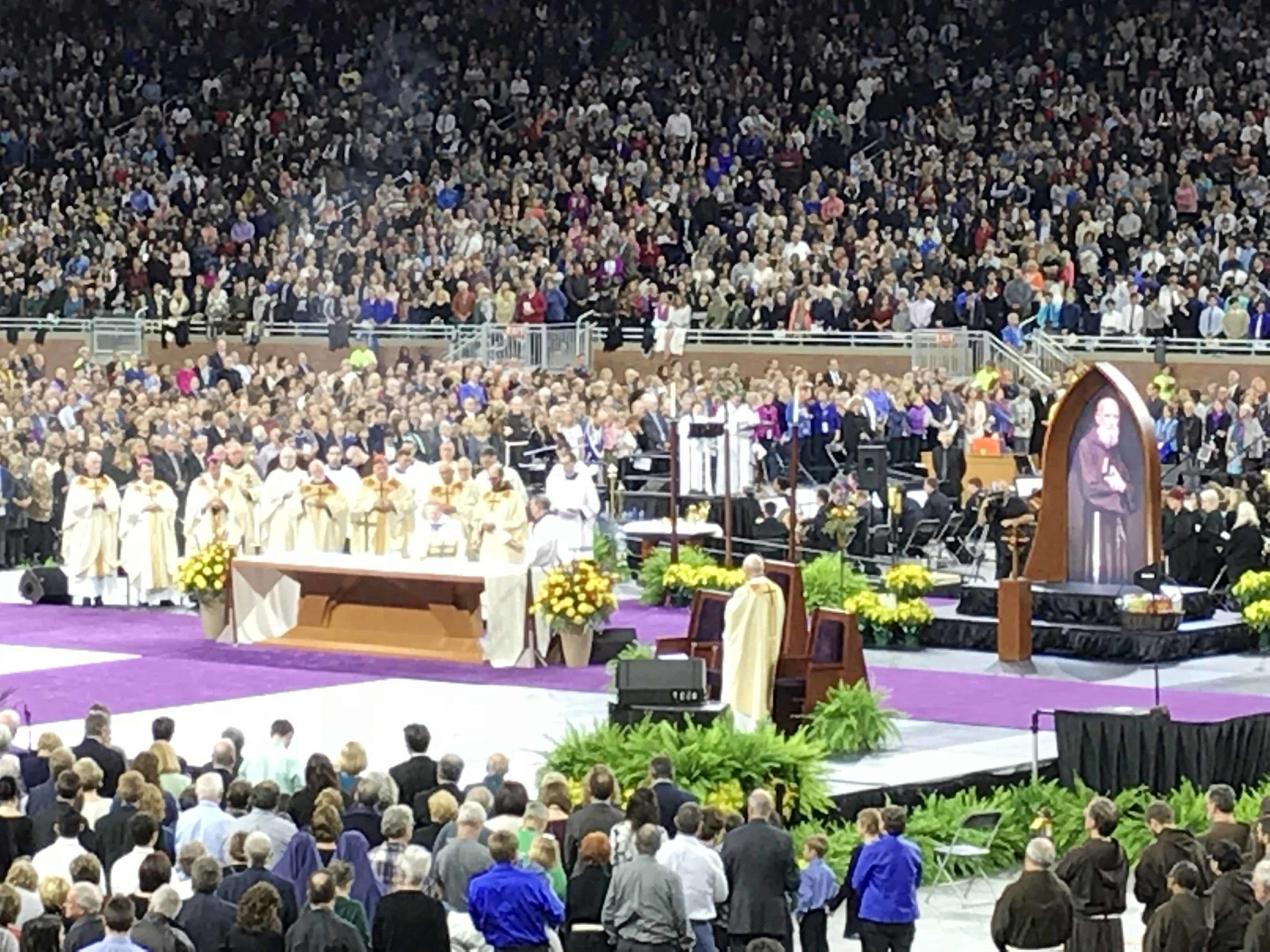I stood just a few feet from the altar and watched as small clouds of incense tumbled out from the censer swung by Cardinal Angelo Amato, Prefect of the Congregation for the Causes of Saints. He had come from Rome to celebrate the Beatification of Fr. Solanus Casey, a poor Capuchin friar who died in Detroit 60 years ago. Bernard Casey (later Solanus) was born in Oak Grove, Wisconsin in 1870 to Irish immigrant parents, the sixth of sixteen children. In 1897 he entered the Order of Friars Minor Capuchin in Detroit, MI. Since the Capuchins’ academic formation was in German, he struggled to pass many of his classes and as a result was ordained a “simplex priest,” unable to preach or hear confession. He spent the rest of his life as a door keeper, first in New York at various friaries and then at St. Bonaventure’s Friary in Detroit. After living for a decade in Indiana, Solanus returned to Detroit for health reasons where he died in 1957 at 86 years old.
Sixty years later, at the Mass of Beatification held on November 18th at Ford Field in Detroit, the feeling was palpable and sometimes voiced aloud: “We have a saint – Detroit has a saint!” Fr. Solanus is only the second American-born male to be beatified, and the first American “blessed” to spend his whole life in the United States. But of all places, Detroit? Yes, Detroit. The wounds Detroit carries in its body – the burnt-out houses and abandoned city blocks – are not a sign of Detroit’s failure. They are the sign of our nation’s failure. Driving past boarded windows in Detroit stings like the memory of unconfessed sins. Even though Solanus didn’t live through the Rebellion of 1967, the sin of which it is a symptom was as noxious in his day as it is in ours. Detroit is an uneasy reminder of our nation’s appalling history of shirked responsibility for the past, economic tunnel-vision in the present, and relentless systemic racism binding the two together; Solanus to so many Detroiters is a reminder of the power of the Gospel over the very same systems of sin and oppression.
Booker Ashe, the first black Capuchin in America said of Solanus, “He was ahead of his time for the way in which he treated me…he saw all people as human beings, as images of God. All the rest was secondary.” Solanus used to say he had two loves: the sick and the poor. People of every race and creed came to St. Bonaventure’s to ask for Fr. Solanus’ prayers and guidance, and when they did not know his name they simply asked for “the holy priest.” When Detroit was hungry, Solanus founded the Capuchin Soup Kitchen; when Detroiters were sick, hundreds found miraculous healing through Fr. Solanus’ intercession.
 The offertory hymn is beautiful and as I continue watching the redolent clouds of smoke flash into existence, tremble a moment, then vanish into the lights above, I consider that perhaps not only our prayers but our lives are like that incense, as sweet as they are passing. Solanus Casey was here a moment then vanished with no books, speeches, or worldly accomplishments to his name. Yet he left something invisible behind, something that brought 20,000 people out to march with his little wooden casket in 1957 and then 66,000 to worship and pray at Ford Field in 2017. It’s something that smells a lot like faith, hope and love for a city, nation, and world too often poisoned by their opposites.
The offertory hymn is beautiful and as I continue watching the redolent clouds of smoke flash into existence, tremble a moment, then vanish into the lights above, I consider that perhaps not only our prayers but our lives are like that incense, as sweet as they are passing. Solanus Casey was here a moment then vanished with no books, speeches, or worldly accomplishments to his name. Yet he left something invisible behind, something that brought 20,000 people out to march with his little wooden casket in 1957 and then 66,000 to worship and pray at Ford Field in 2017. It’s something that smells a lot like faith, hope and love for a city, nation, and world too often poisoned by their opposites.
Back at Ford Field, I watched as the incense drifted up and away into the stadium’s expansive ceiling. I thought of the prayers of the over 66,000 souls gathered to celebrate the life of Fr. Solanus rising up to heaven like the incense. Then I imagined Fr. Solanus there with us. What would he be praying for? I remember my Capuchin friend telling me stories of Solanus. He said there was no word more precious to Fr. Solanus than the word “appreciate.” “If we only appreciated God’s gift to us…” Solanus used to say. I’m startled out of my pious reverie by the perfume of incense as the fan behind the altar blows it like a fistful of roses in my direction.
“Let’s hope some people leave here with a greater love for the poor and desire to forgive, heal and reconcile,” my Capuchin friend said to me, before the Mass began, “That’s what Solanus would have wanted.”
Maybe that’s what Solanus would have been praying for – maybe he still is. I hope so.
Blessed Solanus Casey, pray for us.


